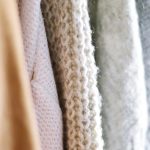Are you curious about the different types of organic cotton fabrics and the benefits of choosing them?
In this ultimate guide, we will explore various organic cotton fabrics that are both sustainable and environmentally friendly.
From the softness of organic cotton jersey to the durability of organic cotton canvas, you will discover the versatility and quality of these fabrics.
Get ready to delve into the world of organic cotton and explore the many options available to you.
Table of Contents
Types of Organic Cotton Fabrics
There are five main types of organic cotton fabrics that you can explore. Two of these types are organic cotton flannel and organic cotton denim.
Organic cotton flannel is a soft and warm fabric that’s perfect for colder weather. It’s made from 100% organic cotton fibers and is brushed on both sides to create a fluffy and cozy texture. This fabric is commonly used for making shirts, pajamas, and blankets. Organic cotton flannel isn’t only comfortable to wear, but it’s also environmentally friendly as it’s produced without the use of harmful chemicals.
On the other hand, organic cotton denim is a durable and versatile fabric. It’s known for its characteristic diagonal weave and is often used to make jeans, jackets, and skirts. Organic cotton denim is made from organic cotton fibers that are woven together tightly to create a sturdy fabric that can withstand regular wear and tear. This fabric isn’t only stylish, but it’s also sustainable as it’s produced using natural and eco-friendly practices.
When choosing organic cotton fabrics, consider the specific qualities and uses of each type. Whether you prefer the softness of flannel or the durability of denim, you can find the perfect organic cotton fabric for your needs.
Benefits of Choosing Organic Cotton
Why should you choose organic cotton?
There are several advantages to selecting organic cotton over conventional cotton. Here are some reasons why organic cotton is important:
-
Health benefits: Organic cotton is grown without the use of harmful chemicals and pesticides, making it safer for farmers, workers, and consumers. By choosing organic cotton, you reduce your exposure to potentially harmful substances.
-
Environmental sustainability: Organic cotton farming practices promote biodiversity, soil fertility, and water conservation. It helps to protect the environment by reducing the use of synthetic fertilizers and pesticides that can contaminate soil, water, and air.
-
Quality and durability: Organic cotton is known for its superior quality and durability. It tends to be softer, stronger, and more breathable than conventional cotton, making it a comfortable and long-lasting choice for clothing and bedding.
-
Ethical production: Organic cotton is often produced using fair trade practices, ensuring that farmers and workers receive fair wages and safe working conditions. Choosing organic cotton supports sustainable and ethical production methods.
Exploring Organic Cotton Jersey
To begin exploring organic cotton jersey, let’s dive into its unique characteristics and versatility. Jersey fabric is known for its stretchy and lightweight nature, making it a popular choice for comfortable and breathable clothing. It’s made from organic cotton, which ensures that no harmful chemicals or pesticides were used in its production. Organic cotton jersey is hypoallergenic and gentle on the skin, making it suitable for those with sensitive skin or allergies.
One of the key properties of organic cotton jersey is its ability to retain its shape and elasticity even after multiple washes. This makes it a durable fabric that can withstand regular wear and tear. Additionally, organic cotton jersey is highly absorbent, allowing it to wick away moisture from the body, keeping you cool and dry.
When it comes to caring for organic cotton jersey, it’s recommended to wash it in cold water on a gentle cycle to prevent any shrinkage. Avoid using harsh detergents or bleach, as these can damage the fabric and strip away its natural softness. It’s best to air dry or tumble dry on low heat to maintain the fabric’s integrity.
Discovering Organic Cotton Canvas
Now let’s delve into the world of organic cotton canvas and explore its unique characteristics and diverse applications.
Organic cotton canvas is a versatile fabric that’s known for being durable, breathable, and environmentally friendly. It’s commonly used in various industries and has a wide range of uses.
Here are some of the different uses of organic cotton canvas:
-
Apparel: Organic cotton canvas is commonly used to make clothing items such as jackets, pants, and skirts. Its durability and breathability make it ideal for creating long-lasting and comfortable garments.
-
Home Furnishings: Organic cotton canvas is also used in the production of home furnishings like upholstery, curtains, and tablecloths. Its sturdy nature and ability to withstand wear and tear make it perfect for these applications.
-
Bags and Accessories: Another popular use of organic cotton canvas is in the production of bags and accessories. From tote bags to backpacks to wallets, this fabric is a popular choice for its strength and eco-friendly properties.
-
Art and Crafts: Organic cotton canvas is often used by artists and crafters as a canvas for painting or a base for embroidery and other crafts. Its natural texture and absorbency make it a preferred choice for these artistic endeavors.
When it comes to caring for organic cotton canvas, it’s recommended to follow the care instructions provided by the manufacturer. Generally, this fabric can be machine washed in cold water and tumble dried on low heat. However, it’s always best to check the specific care instructions to ensure the longevity of the fabric.
Other Organic Cotton Fabric Options
Explore the diverse range of other organic cotton fabric options available to you. In addition to organic cotton canvas, there are several other sustainable options for you to choose from. Organic cotton bed sheets are a popular choice for those looking to create a more eco-friendly bedroom. These bed sheets are made from organic cotton, which is grown without the use of harmful pesticides and chemicals. Not only are they better for the environment, but they also provide a soft and comfortable sleeping surface.
To help you navigate through the various organic cotton fabric options, here is a table showcasing some popular choices:
| Fabric Type | Description | Best Use |
|---|---|---|
| Organic Cotton Jersey | Lightweight and stretchy fabric, perfect for t-shirts and activewear. | Clothing |
| Organic Cotton Twill | Sturdy and durable fabric with a diagonal weave, ideal for pants and jackets. | Apparel |
| Organic Cotton Muslin | Soft and breathable fabric, often used for baby clothes and swaddles. | Baby Products |
| Organic Cotton Flannel | Warm and cozy fabric, great for pajamas and blankets. | Bedding |
Frequently Asked Questions
Is Organic Cotton More Expensive Than Regular Cotton?
Organic cotton is usually more expensive than regular cotton due to various factors such as limited availability and higher production costs. However, the cost comparison is justified by its positive environmental impact.
Are There Any Specific Care Instructions for Organic Cotton Fabrics?
To care for organic cotton fabrics, follow these instructions: machine wash cold, use mild detergent, avoid bleach, tumble dry low or hang to dry. The benefits of using organic cotton for clothing include being environmentally friendly and gentle on your skin.
How Do I Know if a Product Is Truly Made From Organic Cotton?
To identify genuine organic cotton products, look for certifications like GOTS or USDA Organic. Don’t be fooled by labels that only say "natural" or "eco-friendly." These are common misconceptions about organic cotton.
Can Organic Cotton Fabrics Be Used for Delicate or Sensitive Skin?
Organic cotton fabrics are ideal for delicate or sensitive skin. They provide numerous benefits, such as being hypoallergenic, soft, and breathable. Compared to other fabrics, organic cotton ensures maximum comfort and reduces the risk of skin irritations.
Are There Any Special Certifications or Standards for Organic Cotton Fabrics?
There are special certifications and standards for organic cotton fabrics. Choosing organic cotton has many benefits, such as being better for the environment and reducing exposure to harmful chemicals.
- How Does Ring Spun Cotton Affect Garment Fit and Shape Retention? - August 13, 2024
- What Are the Challenges in Producing Ring Spun Cotton? - August 13, 2024
- Is Ring Spun Cotton Suitable for Plus-Size Clothing? - August 13, 2024



